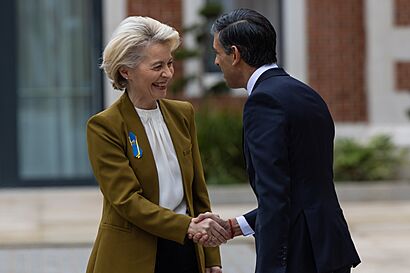Windsor Framework facts for kids
The Windsor Framework is a special agreement between the European Union (EU) and the United Kingdom (UK). It was created after Brexit to change how the Northern Ireland Protocol works. This new deal was announced on February 27, 2023, and officially started on October 1, 2023.
The main goal of the Framework was to fix problems with the Northern Ireland Protocol. This Protocol meant that Northern Ireland stayed part of the EU's single market for goods. This created a kind of trade border in the Irish Sea for goods moving from Great Britain to Northern Ireland. The Windsor Framework aims to make it easier for goods to move between Great Britain and Northern Ireland. It also gives the UK more control over things like VAT (a type of tax) and medicines in Northern Ireland.
After the Framework was announced, some politicians in Northern Ireland, especially those who support staying in the UK (called Unionists), still had concerns. They felt that Northern Ireland's place in the UK's own market was still affected. These concerns led to the Democratic Unionist Party (DUP) stopping the Northern Ireland Assembly from working. This meant Northern Ireland's local government was paused. However, in January 2024, the UK Government and the DUP agreed on some changes. This led to the DUP ending their boycott and the local government starting up again.
Contents
What's in the Agreement?
The Windsor Framework focuses on goods that travel across the Irish Sea from Great Britain to Northern Ireland. It introduces new ways to check these goods, making it simpler for many items.
Green and Red Lanes
The agreement uses "green and red lanes" to sort goods.
- The green lane is for goods that are definitely staying in Northern Ireland. These goods have fewer checks and less paperwork.
- The red lane is for goods that might move into the EU's single market. These goods have more checks to make sure they follow EU rules.
The Framework also includes agreements on things like medicine rules, VAT, and alcohol taxes.
"Not for EU" Labels
To help with the green lane, some food items from Great Britain will have "not for EU" labels. This means the product doesn't meet EU standards and can't be sold in the EU. These labels will be added over three years. For example, meat and fresh dairy products started needing labels in October 2023.
Stormont Brake
The Framework also created something called the "Stormont brake." This allows the Northern Ireland Assembly to temporarily stop new EU goods rules from applying in Northern Ireland. This can happen if the Assembly believes the new rules would have a "significant and lasting effect on everyday lives."
To use the Stormont brake, at least 30 members of the Northern Ireland Assembly from two or more parties must object to a new rule. This starts a 14-day discussion period. Then, the UK Government decides whether to block the EU rule permanently. A special committee, the Windsor Framework Democratic Scrutiny Committee, was set up to help with this.
How the Agreement Was Made
The agreement was named after a meeting between the UK Prime Minister, Rishi Sunak, and the President of the European Commission, Ursula von der Leyen. They met at the Fairmont Hotel near Windsor Great Park. After announcing the deal, Ursula von der Leyen also had tea with King Charles III at Windsor Castle.
The UK Parliament voted on the Framework on March 22, 2023. It passed with a large majority. This vote stopped some other legal actions related to Brexit. On the EU side, different parts of the agreement needed approval from various EU bodies, like the Council of the European Union and the European Parliament.
Reactions to the Framework
Many people and groups shared their thoughts on the Windsor Framework.
Ireland
Leo Varadkar, the leader of Ireland (called the Taoiseach), welcomed the agreement. He said Ireland would help make the new arrangements work for people and businesses in Northern Ireland. The Sinn Féin party also supported the deal.
Northern Ireland
Michelle O'Neill from Sinn Féin said that having access to both the UK and EU markets was a good thing.
The leader of the DUP, Sir Jeffrey Donaldson, said the Framework was an improvement but still had problems. He said it needed to pass his party's "seven tests" for a good replacement to the Northern Ireland Protocol. Some DUP members, like Sammy Wilson, were worried the Stormont brake wouldn't fully restore Northern Ireland's place in the UK. The DUP later decided to oppose the Framework, saying it still made Northern Ireland follow EU law.
Other parties, like the Alliance Party and the Social Democratic and Labour Party, also shared their views. They had some concerns about the Stormont Brake but liked the idea of having access to both the UK and European markets.
United Kingdom
Former Prime Minister Boris Johnson said it would be "very difficult" for him to vote for the Framework. He felt the deal didn't give the UK enough control. Another former Prime Minister, Liz Truss, agreed with Johnson.
On March 22, 2023, the day of the vote in Parliament, 22 Conservative Members of Parliament and six DUP MPs voted against the Framework. However, the agreement still passed easily with 515 votes for and 29 against.
International
US President Joe Biden called the Framework an "essential step" to protect and strengthen the peace agreement in Northern Ireland, known as the Belfast/Good Friday Agreement.
Images for kids
-
Rishi Sunak and Ursula von der Leyen in Windsor on 27 February 2023 to announce the finalised deal
See also
- Brexit withdrawal agreement
- Petition of concern
 | Delilah Pierce |
 | Gordon Parks |
 | Augusta Savage |
 | Charles Ethan Porter |



